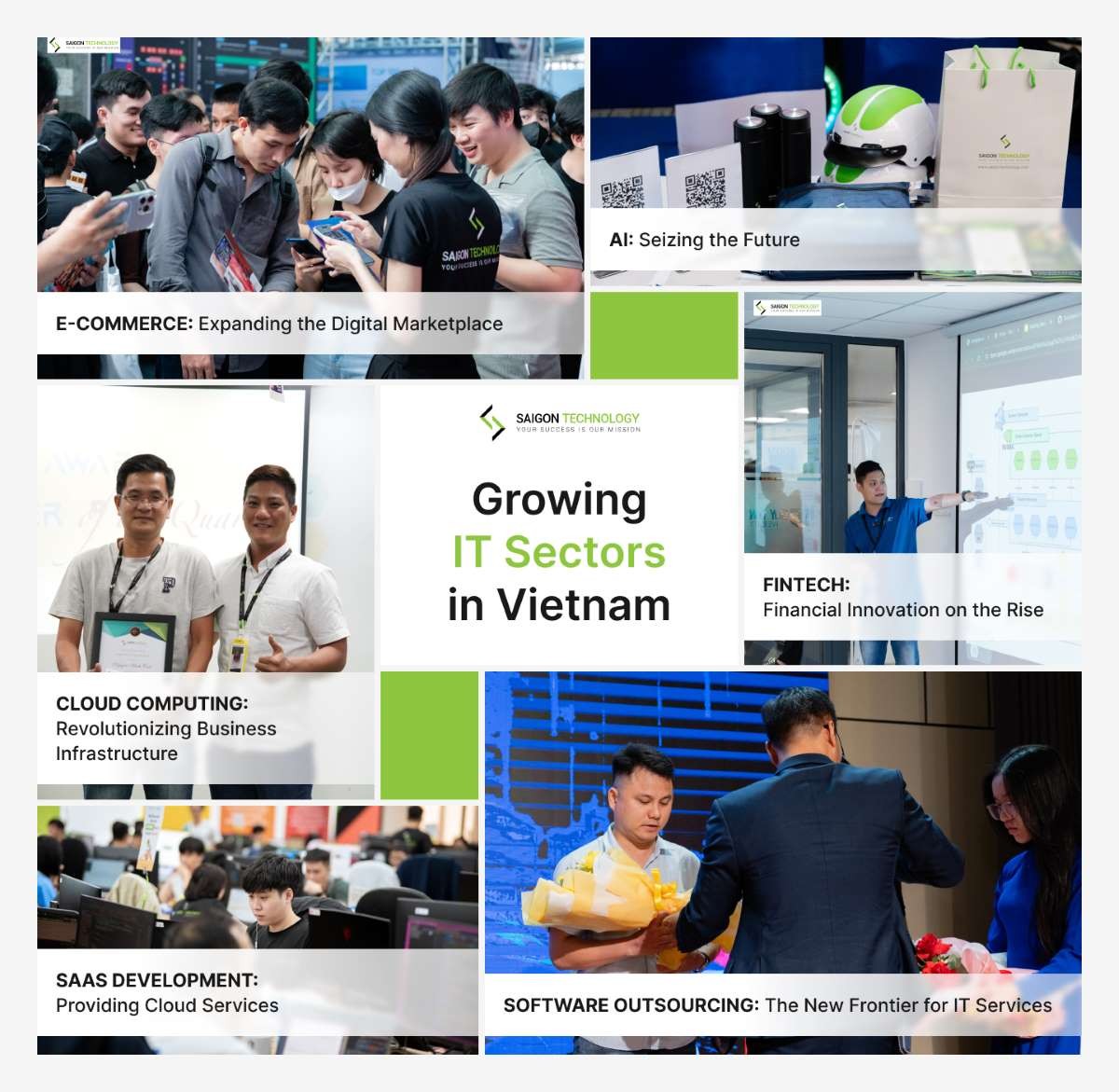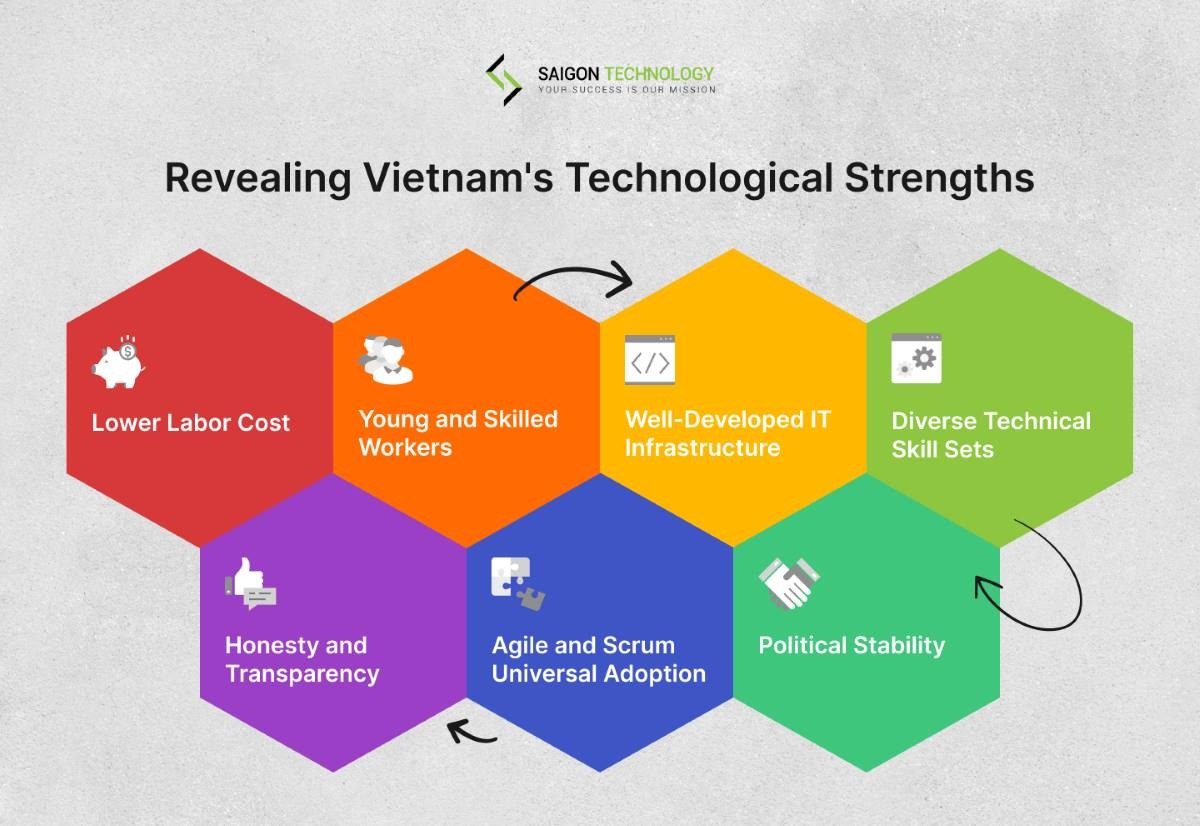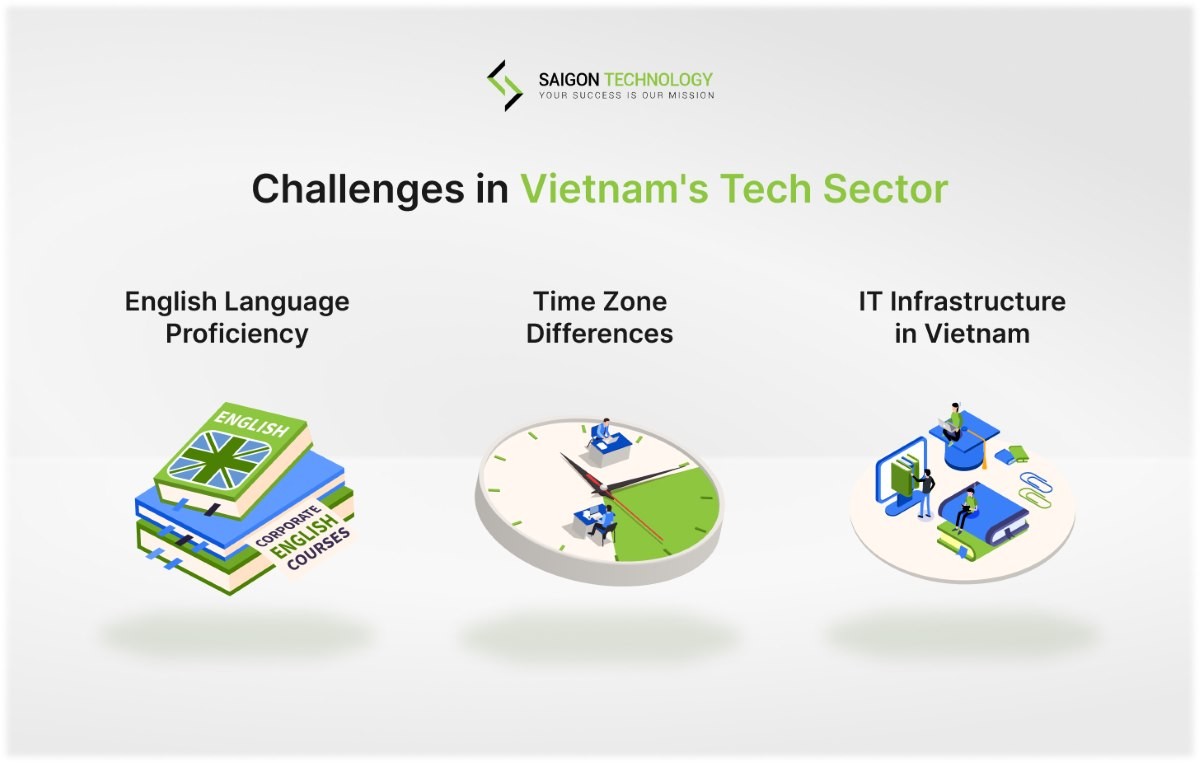The technology landscape has rapidly transformed into a global powerhouse, marking its territory as an emergent leader in the IT sector. The Vietnam IT industry, with its dynamic growth, innovation, and burgeoning talent pool, is on the cusp of reshaping the digital future. From startups to software development giants, Vietnam technology is carving out a niche in the international market, fueled by a forward-thinking approach and government support.
As we dive deeper into this vibrant ecosystem, we uncover how Vietnam is not just participating in the global technology revolution – it is pioneering its trajectory.
Nurturing the Tech Capital of Southeast Asia: Vietnam’s Remarkable Leap in the Global IT Arena
The Vietnam IT industry stands on the brink of a transformation, poised to become the leading software hub in Southeast Asia. A confluence of favorable demographics, economic vigor, and competitive labor costs has catapulted technology to the forefront of the global outsourcing market.
Unlike its regional peers, such as Thailand or Malaysia, Vietnam offers unparalleled cost efficiencies in securing a skilled workforce, particularly in the software development domain.
This cost advantage is further augmented by the country’s unique demographic profile – a vibrant cohort where over 60% are under the age of 30, fluent in English, and digitally savvy. The Vietnam software industry thrives on this youthful energy, fostering a culture of innovation and technical proficiency.
Economically, Vietnam has witnessed an impressive growth trajectory, creating a robust foundation for the tech sector’s expansion. The nation’s literacy rate stands at an impressive 94%, signaling a populace ready to engage with and advance within the digital economy.
The global appetite for software development outsourcing has burgeoned, and Vietnam is answering the call with agility and expertise. The rise of Vietnam technology firms specializing in software development, testing, maintenance, and support is a testament to the country’s strategic leveraging of its youthful population and linguistic capabilities.
The driving force behind the country’s ascent as a tech hub is its strong talent pool. With over half of its citizens under 25 and significant investments in STEM education, Vietnam is churning out a new generation of engineers and programmers from its world-class universities.
Moreover, the Vietnam IT industry benefits from some of the most competitive labor costs in Southeast Asia. This economic advantage is complemented by a cost of living that is attractive not just for local talent but also for foreign entities looking to invest.
Vietnam’s robust economic growth, evidenced by a GDP surge of over 8% in 2022 and a burgeoning middle class, makes it a prime destination for software development. The country’s tech ecosystem, with all its compelling attributes, is not merely emerging – it’s soaring, and it’s ready to dominate the Southeast Asian software landscape.
The Rising Tide of Vietnam’s IT Talent: A Closer Look at the Booming Tech Workforce
The Vietnam technology scene has achieved notable strides with innovation inputs, ascending the ranks on the Global Innovation Index 2022 (GII), signaling its burgeoning influence in the global tech sphere. In the same vein, the nation has seen a considerable influx of foreign direct investment (FDI), with $17.9 billion pouring in during 2022. Such economic indicators, along with a commendable 48th place in the Human Capital Index (HCI); trailing only Singapore within the ASEAN region; underscore the country’s potential as a technology hub.
Currently, the Vietnamese IT market boasts an impressive reserve of talent, with over 530,000 IT engineers. The academic infrastructure supporting this workforce includes 153 universities and IT training institutes, producing approximately 50,000 IT graduates annually. This educational thrust has positioned the country as an ideal location for outsourcing, particularly for positions such as software developers in Vietnam.
Delving into the demographics of Vietnam’s IT talent, we observe that a majority of software developers fall within the Millennial age bracket, with a significant 8.8% having embarked on coding before turning 20. The 20-29 year age group makes up a substantial 53.2% of the talent pool.
Geographically, the distribution of IT talent is concentrated within the country’s urban hubs. Hanoi accounts for 34.7% while Ho Chi Minh City, the economic heart of the country, boasts 55.3% of the IT workforce. Danang also emerged as an increasingly important tech city, drawing in foreign investment with its stable socio-political environment.
Despite the IT sector being predominantly male, with over 90% of the talent pool, there has been a notable increase in female participation. Women, now over 6% and growing, are carving out their space in the industry, particularly those with more than two years of experience. This shift reflects a broader trend of gender diversification within the technology sector in Vietnam.
Harnessing the Fourth Industrial Wave: Vietnam’s Leap into Industry 4.0 and Its Tech Sector Evolution
Vietnam is steering through the wave of Industry 4.0 with an agility that could redefine its status in the global tech landscape. This new industrial paradigm; characterized by the convergence of the digital, physical, and biological realms; promises to catapult the Vietnam technology sector to unprecedented heights. In this realm, machines are not just tools but collaborators, capable of independent decision-making and communication.
The transformation is profound, with traditional business models giving way to innovative strategies that align with Industry 4.0’s principles. Vietnam’s adaptation to this shift is visible through the modernization of factories and businesses, ensuring they align with the new era’s demands.
With the government’s significant investment in the Vietnam IT industry, including infrastructure enhancements like fiber optic installations and e-commerce facilitation, the country is laying a robust groundwork for a digital economic transition. This preparation extends to nurturing a conducive environment for foreign investment, attracting global players to set roots in the country.
A prime manifestation of Industry 4.0’s impact in Vietnam is the Samsung Factory in the Bac Ninh province – a testament to the nation’s capability to host and operate fully automated, state-of-the-art production facilities.
For process industries, the Industry 4.0 revolution brings the necessity for agility and interconnectivity. Samsung’s Bac Ninh factory exemplifies the shift toward automation, where software and smart systems enable seamless operational management, from inventory tracking to production scheduling.
The challenges of Industry 4.0 are matched by its solutions: enhanced automation, smarter and faster production, and a lean toward sustainability. Industries across the board, from garment manufacturing to agriculture, are integrating advanced technologies to revolutionize their production processes.
Embracing an Industry 4.0 model, the country anticipates benefits like increased efficiency, responsiveness to market fluctuations, and sustainable practices. These are not mere enhancements but transformative changes that could define a software development company in Vietnam as a leader in the fourth industrial revolution’s global narrative.
Sustaining Momentum: The Growth Engines of Vietnam’s IT Industry
As the digital era unfolds, Vietnam is distinguishing itself as a significant player in the global information technology landscape. The Vietnam IT sector has become a beacon of high economic growth, influencing a diverse range of industries from mobile manufacturing to software outsourcing. At the heart of this digital revolution is a suite of burgeoning industries, each playing a pivotal role in the country’s IT renaissance.
Saigon Technology, a top player in Vietnam’s tech industry, is leveraging these growth sectors to cement its position as a premier provider of cutting-edge IT solutions. This article delves into the core segments driving Vietnam’s IT industry forward, underscoring the transformative impact of technology in a rapidly developing market. Let’s explore how Saigon Technology and other local entities are capitalizing on these trends to propel the country onto the global stage.
1. Artificial Intelligence: Seizing the Future
Vietnam’s foray into Artificial Intelligence (AI) is marked by a surge in innovative applications across vital sectors. The government’s resolution to increase FDI is a strategic move to support companies in their quest to excel in AI development. With a keen focus on e-government and smart city solutions, we’re poised to leverage the AI revolution to deliver advanced solutions that can alleviate urban challenges like traffic congestion.
2. E-commerce: Expanding the Digital Marketplace
Vietnam’s e-commerce landscape is set to climb the regional ranks, buoyed by tech-savvy consumers and high internet penetration. We recognize this trend, offering bespoke e-commerce solutions that cater to the urban centers of Ho Chi Minh City and Hanoi while also tapping into the rural potential. By addressing the logistical and development challenges, we’re at the forefront, enabling businesses to transition smoothly into the digital commerce space.
3. Cloud Computing: Revolutionizing Business Infrastructure
The shift to cloud computing marks a pivotal change in how the country’s businesses approach data and operations management. We are actively involved in this transition, providing cloud transformation services that cater to the need for agility and cost-efficiency. By modernizing legacy systems, we aid businesses in embracing scalable and secure cloud solutions that promise a competitive edge in a dynamic market.
4. Fintech: Financial Innovation on the Rise
The burgeoning Fintech sector in Vietnam, expected to reach 18 billion USD by 2024, presents a dynamic field of opportunities. With our deep understanding of the local market, crafts tailored fintech solutions that resonate with the country’s young demographic. From digital payments to blockchain services, we’re enabling the financial sector to navigate the digital shift with innovation and security.
5. Education Technology: Bridging Learning Gaps
The EdTech sector in the country is receiving a wave of international investments, recognizing the critical role of technology in education. Our role in this sector is to provide robust EdTech platforms that bridge the educational divide, catering to the growing demand for quality online education and language learning services. By focusing on user-friendly interfaces and adaptive learning technologies, we’re contributing to the formation of an advanced educational framework.
6. Software Outsourcing: The New Frontier for IT Services
The decade-long boom in Vietnam’s outsourcing industry has positioned the country as a key player in the global IT services market. With our expansive expertise, we’re at the heart of this growth, offering competitive outsourcing solutions that cater to international markets like Australia and the US. By operating in tech hubs like Da Nang, we’re expanding our global footprint, delivering high-quality software development services at competitive costs.
7. SaaS Development: Providing Cloud Services
Revenue from the Saas sector is expected to boost the country’s economy in 2023, with projected turnover anticipated to reach US$174.10m. Also, the report indicates that we should see an 11% increase annually, which means there will be a booming market for the service.
The Pillars of Vietnam’s IT Ascendancy: Unveiling the Strengths in Technology
The Vietnam technology sector boasts several competitive advantages, establishing the country as an attractive destination for IT investment and development. With the country’s IT industry experiencing rapid growth, these strengths are critical in understanding the nation’s increasing appeal in the global tech landscape.
- Lower Labor Cost: Vietnam offers cost-effective IT solutions, with outsourcing services typically 20-30% cheaper than in Eastern Europe and Latin America. This cost advantage doesn’t come at the expense of quality, as the country’s tech infrastructure rivals that of more established markets.
- Young and Skilled Workers: A prodigious output of engineering graduates ensures that Vietnam has the manpower to undertake large, labor-intensive tech projects. The quality of these engineers is recognized globally, with the country ranked highly for the caliber of its developers.
- Well-Developed IT Infrastructure: Encouraged by government incentives, local IT businesses have been investing in R&D and infrastructure, allowing them to handle complex projects. Tech parks like Saigon Hi-Tech Park are a testament to Vietnam’s commitment to becoming a premier IT outsourcing hub.
- Diverse Technical Skill Sets: Vietnamese IT engineers offer a broad spectrum of technical skills. For instance, Saigon Technology provides expertise ranging from backend development in various programming languages to database management and mobile app development.
- Political Stability: The country’s socio-economic environment is one of the most stable in Asia, with no major political conflicts since its independence. This stability is crucial for the uninterrupted progress of IT projects.
- Easy Communication: The emphasis on English in education means that Vietnam tech companies have access to a talent pool proficient in English, ensuring clear communication with international clients.
- Agile and Scrum Universal Adoption: Vietnamese IT service providers embrace Agile and Scrum methodologies, ensuring efficient project management and the ability to adapt to clients’ evolving needs.
- Honesty and Transparency: Vietnamese IT firms are known for their straightforward business practices, offering clients transparency in costs and timelines, which is not always the case in the IT outsourcing industry globally.
These strengths highlight why Vietnam’s software industry and tech sectors are becoming increasingly prominent on the world stage, offering a compelling blend of cost-efficiency, talent, and stability that is attractive to businesses worldwide.
Addressing the Challenges: Navigating the Weaknesses of Vietnam’s Tech Sector
Despite the considerable strengths of the country’s technology sector, it’s important to recognize and address the challenges that exist. Acknowledging these weaknesses is crucial for fostering a resilient and more robust Vietnam tech landscape.
– English Language Proficiency
While English is the lingua franca for the Vietnam software industry working with international partners, it is not the native language in Vietnam, which can lead to communication barriers. Companies are actively working to improve English proficiency among their employees through initiatives like English clubs and designating full English-speaking days. Clients are advised to ensure their project leaders and key communicators have the necessary language skills and to prefer vendors with a proven track record of international collaboration.
– Time Zone Differences
The time zone disparity, with Vietnam being GMT+7, presents logistical challenges, particularly for real-time collaboration required in agile development models. Clients and Vietnamese IT providers need to strategize on communication methods and project management to mitigate the impact of time differences. Considering a project-based model may also minimize the need for constant interaction, allowing for smoother project progression despite the geographical distance.
– IT Infrastructure in Vietnam
One of the greatest challenges of IT infrastructure in the county is connectivity. It’s a necessity for social integration, economic development, and access to vital information. The challenges here are internet penetration and rural connectivity. It’s hoped that broadband infrastructure will improve over the next decade while extending mobile network coverage.
Unfolding Opportunities: Vietnam’s IT Industry on the Rise
Vietnam’s technology is burgeoning with opportunities, propelled by the privatization of state-owned enterprises and the vitality of the telecommunications and banking sectors. The Vietnam IT industry, particularly in high-stakes areas like banking, finance, and telecoms, is ripe for investment, promising lucrative returns for bespoke and off-the-shelf software solutions.
Young & Tech-Savvy Population
Vietnam’s digital generation forms a substantial portion of the populace. This young, digitally adept group is becoming an increasingly significant consumer and contributor to the Vietnam tech scene.
The nation’s high internet penetration rate, with 72.1 million users, ranks 13th globally. Such connectivity is not just a conduit for consumption but a platform for innovation and engagement with global technology trends.
Advancements in IT Education
IT education, governed by the Ministry of Education and Training, is undergoing liberalization, fostering innovation and improving access to higher education. The system produces about 80,000 IT graduates annually, a significant number of whom specialize in computer science and related fields, bolstering the Vietnam IT industry with fresh talent and ideas.
Supportive Government Policies
Vietnam’s digital transformation strategy is comprehensive, targeting the digital government, society, and economy, and aims to contribute up to 30% of GDP. Initiatives like the Vietnam National Innovation Center (NIC) are pivotal in nurturing the startup ecosystem and promoting scientific and technological progress as drivers of economic growth.
The government’s commitment is further evident in generous Corporate Income Tax (CIT) incentives for IT companies, fostering a conducive environment for tech investment and innovation.
Emergence of Cutting-Edge Technologies
The cloud computing market in Vietnam, already valued at over USD 133 million, is expected to expand to USD 500 million within five years. The AI sector, too, is gaining traction, with Vietnam securing a commendable position in Southeast Asia’s Government AI Readiness Index and attracting significant venture capital investment.
Dynamic Startup Ecosystem
Vietnam’s startup landscape is thriving, with investments skyrocketing to USD 2.6 billion in 2021. This growth is supported by substantial foreign investment from globally renowned firms, cementing Vietnam’s status as an emerging hub for tech innovation and funding.
The IT Outsourcing Boom
The shift in work dynamics due to the pandemic has paved the way for new models of employment within the IT sector. Vietnam’s robust IT workforce and digital transformation policies have laid the groundwork for economic resurgence. Recognized as a leading IT outsourcing destination, Vietnam’s IT human resources are well-positioned for growth and innovation, offering a fertile ground for software outsourcing and technological development.
These opportunities collectively signal a bright future for Vietnam’s technology and its potential to catalyze socio-economic advancement through strategic development and investment in human capital.
Vietnam’s Tech Epicenters: A Deep Dive into High-Tech Parks
-
Saigon Hi-Tech Park, (Ho Chi Minh City Hi-Tech Park)
Saigon Hi-Tech Park (SHTP), sometimes also called Ho Chi Minh City Hi-Tech Park, was inaugurated on October 24, 2002. SHTP stands as a beacon for potential domestic and international investment due to its strategic location, robust economic potential, and comprehensive investment incentives. Nestled at the crossroads of major highways, just a stone’s throw from the Vietnam National University, and equidistant from Tan Son Nhat International Airport and Cat Lai Port, SHTP offers unparalleled connectivity.
Surrounded by more than 40 industrial parks as well as impressive export processing zones, SHTP benefits from an extensive network of supply and customer chains. The forthcoming Metro line promises to enhance this connectivity, bridging SHTP with the heart of Ho Chi Minh City and fostering seamless trade operations.
Investors at SHTP benefit from staggered land rental fees and significant tax incentives, especially for projects dedicated to research, training, and incubation. The park’s investment magnet sectors include Microelectronics, Information Technology, Telecommunications, Precision Mechanics, Automation, Biotechnology, New Energy, New Materials, and Nanotechnology.
-
Hoa Lac Hi-tech Park
Established by the Prime Minister’s Decision on October 12, 1998, Hoa Lac Hi-tech Park is a state-invested development aimed at catalyzing industrial and modernization processes throughout the region. Approximately 30 km from the capital and flanked by both the impressive Culture and Tourism Village of Vietnam’s Ethnic Minorities and prestigious Hanoi National University, Hoa Lac is poised to become a science and technology hub.
With strategic transportation links to major ports and airports and future infrastructure projects like urban railway No. 5, Hoa Lac is well-positioned to draw in and retain high-quality human resources. The park’s investment incentives include a 10% corporate tax rate for up to 30 years, with tax holidays and reductions in the initial phase of operation, and exemption from import tax on certain products.
Investment in Hoa Lac is directed toward functional zones with a focus on research, production, training, infrastructure development, finance, business, and commerce, with priority given to fields like Automation Technology, Material Technology, Biotechnology, and Information Technology.
-
Da Nang Hi-tech Park
Da Nang Hi-tech Park stands out for its attractive investment incentives. It has a strategic geographical location surrounded by modern infrastructure and boasts favorable natural conditions. These factors combine to make it a sought-after destination for investors. The park aims to attract investments that align with its goal of enhancing competitiveness and economic efficiency, not just for Da Nang but for the broader Central and Central Highlands region.
The Management Board of Da Nang Hi-Tech Park continuously endeavors to streamline administrative procedures and prepare production land, ensuring that the park is investor-ready. Its target investment sectors encompass Biotechnology, Microelectronics, Mechatronics, Optoelectronics, Automation, New Materials, New Energy, Information Technology, and Environmental Technology.
Envisioning the Future: The Trajectory of Vietnam’s Tech Industry
As we reflect on the expansive growth and future prospects of Vietnam technology and the Vietnam IT industry, it’s clear that entities like our company are pivotal in steering this progress. We, with our commitment to innovation and excellence, embody the potential and ambition of Vietnam’s tech scene.
The synergistic relationship between national development initiatives and our strategic endeavors illustrates a promising future. Together, they are setting the stage for Vietnam to emerge as a beacon of technological advancement and a competitive player in the global IT industry. The path ahead for Vietnam technology is bright, and we’re poised to be at the forefront of this transformative journey.
Propel Your Business Forward with Saigon Technology
Join Saigon Technology as we lead the charge in Vietnam’s IT revolution. Connect with us to harness the power of innovation and drive your business forward in the heart of Southeast Asia’s burgeoning tech hub. Let’s build the future together. Contact Saigon Technology today.
Navigating the IT Landscape: Key FAQs on Vietnam’s Tech Industry
1. How does Vietnam’s cost of IT services compare to other countries?
Vietnam’s IT services are highly competitive, often costing 20–30% less than those in major outsourcing destinations such as Eastern Europe (e.g., Poland, Ukraine, Romania) and Latin America (e.g., Brazil, Mexico, Colombia). Compared with traditional Asian outsourcing hubs like India and the Philippines, Vietnam also offers comparable or lower rates while maintaining strong service quality. This cost-efficiency, coupled with a skilled workforce, makes Vietnam an attractive outsourcing destination for global businesses.
2. What kind of IT infrastructure does Vietnam offer to investors and tech companies?
Vietnam boasts a well-developed IT infrastructure, supported by government incentives and investments in high-tech parks like Saigon Hi-Tech Park, Hoa Lac Hi-tech Park, and Da Nang Hi-tech Park. These parks offer state-of-the-art facilities and are strategically located to optimize connectivity and trade.
3. What is the government’s role in shaping Vietnam’s IT industry?
The Vietnamese government plays a crucial role by implementing policies that foster a conducive environment for digital transformation and innovation. This includes tax incentives for IT companies, investment in education and training to produce a skilled workforce, and support for the startup ecosystem through initiatives like the Vietnam National Innovation Center (NIC).
















